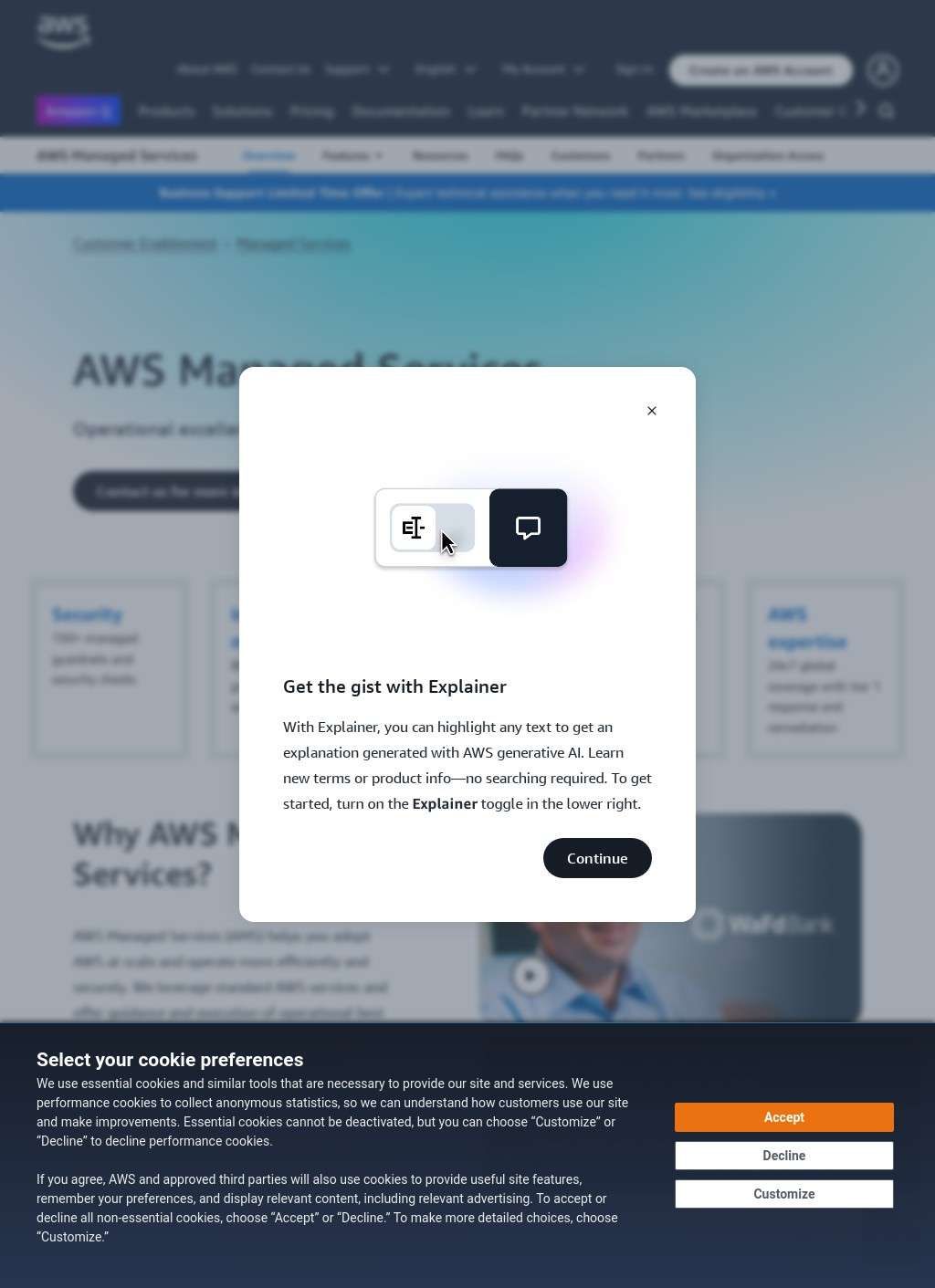AWS Managed Services represents Amazon's premier offering for enterprise organizations seeking comprehensive operational support for their cloud infrastructure. The service enables companies to leverage AWS capabilities while transferring the operational burden to Amazon's expert teams, allowing internal resources to focus on application development and business innovation. AMS provides ongoing management of AWS infrastructure through proven best practices, automated operations, and continuous monitoring that ensures optimal performance and security across complex enterprise environments.
The platform operates on an automation-first philosophy that reduces human error while delivering consistent, repeatable results across all managed environments. AWS has developed sophisticated automation frameworks that handle routine operational tasks such as patching, backup management, capacity planning, and performance optimization without requiring manual intervention. This approach typically delivers 10-15% annual cost savings through improved efficiency and reduced operational overhead. The automation systems continuously learn from operational patterns, becoming more effective over time at predicting and preventing issues before they impact business operations.
Security monitoring and remediation form the backbone of AMS operational excellence. The service provides continuous 24x7x365 monitoring of client environments using advanced threat detection systems that analyze billions of events daily. When security incidents are detected, automated response systems immediately implement containment measures while alerting human specialists for complex investigations. This multi-layered approach ensures rapid response to potential threats while maintaining detailed audit trails for compliance reporting. AWS security experts regularly review and update security configurations to address emerging threats and maintain alignment with industry best practices.
The service architecture supports both single-account and multi-account landing zones, accommodating organizations with varying levels of complexity and governance requirements. Multi-account strategies enable enterprise customers to implement proper separation of concerns across different business units, environments, and applications while maintaining centralized governance and security controls. AMS specialists help design account structures that support organizational requirements while implementing automated cross-account management capabilities that maintain consistency and compliance across the entire AWS footprint.
Incident management processes follow established ITIL frameworks that prioritize business impact and ensure rapid resolution of operational issues. When problems occur, AMS teams immediately begin working through structured escalation procedures that engage appropriate expertise based on incident severity and complexity. The service maintains detailed incident histories that enable root cause analysis and continuous improvement of operational procedures. These insights feed back into automation systems, helping prevent similar issues from occurring in the future while building organizational knowledge that improves overall reliability.
Cost optimization capabilities extend beyond simple resource rightsizing to include comprehensive analysis of usage patterns, architectural recommendations, and strategic guidance on service selection. AMS specialists regularly review client environments to identify opportunities for cost reduction through reserved instance purchases, spot instance utilization, and architectural optimizations that improve efficiency without compromising performance. The service includes detailed cost reporting that provides visibility into spending patterns and identifies trends that might indicate opportunities for further optimization.
Well-Architected Framework reviews ensure client environments align with AWS best practices across five key pillars: operational excellence, security, reliability, performance efficiency, and cost optimization. These comprehensive assessments examine current architectures against established criteria, identifying areas for improvement and providing specific recommendations for addressing gaps. Regular reviews help organizations maintain alignment with evolving best practices while taking advantage of new AWS services and features that could benefit their operations.
The AWS Control Tower integration provides enhanced governance capabilities for organizations implementing landing zone strategies across multiple AWS accounts. AMS can assume operational responsibility for Control Tower environments, providing ongoing monitoring, compliance enforcement, and automated remediation of policy violations. This approach enables organizations to implement sophisticated governance frameworks without requiring deep internal expertise in AWS management and compliance systems.
Partner ecosystem integration allows AMS to work seamlessly with existing managed service providers, system integrators, and specialized consulting firms. This collaborative approach ensures clients can maintain relationships with trusted partners while gaining access to AWS's deep platform expertise. Partner certification programs ensure external providers understand AMS operational procedures and can integrate effectively with Amazon's service delivery model. This ecosystem approach provides flexibility while maintaining consistency and quality standards across all managed services.
Reporting and transparency mechanisms provide clients with detailed insights into operational performance, security posture, and cost trends. Executive dashboards translate technical metrics into business language, helping leadership understand the value delivered by their AWS investments. Regular service reviews include recommendations for architectural improvements, new service adoption, and strategic planning that aligns technology capabilities with business objectives. These insights enable informed decision-making around future cloud strategies and investment priorities.
The migration and onboarding process includes comprehensive planning, risk assessment, and phased implementation that minimizes business disruption. AMS specialists work closely with client teams to understand existing architectures, business requirements, and operational procedures before developing detailed migration plans. The service includes validation testing, rollback procedures, and performance monitoring that ensures successful transitions to managed operations. Ongoing training and knowledge transfer help client teams understand how to work effectively within the AMS operational model.
